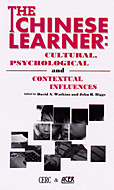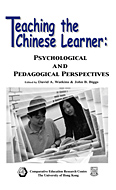THE PARADOX OF THE CHINESE LEARNER

Enter “The Paradox of the Chinese Learner”, which I articulated in 1992 at the Fourth Asian Regional Congress of Cross-Cultural Psychology, Kathmandu, Nepal, and later published in ‘Approaches to learning of Asian students: A multiple paradox’ in J. Pandy, D. Sinha, and P.S. Bhawuk (Eds.) Asian contributions to cross-cultural psychology (pp. 180-199). New Delhi : Sage, 1996. The answer to the paradox is complex. Meaningful or deep memorisation, based on reflective repetition, is an important strategy in learning anything complex (try understanding a Mahler Symphony in one hearing), and this is a strategy used a lot in Asian teaching: “repetition is the route to understanding” as their saying goes. Another important issue is simply cultural: in neo-Confucian cultures, education is highly valued, and effort is considered more important for success than ability, whereas Westerners like to think you have either got it or you haven’t. All of which adds up to the fact that Asian students study one hell of lot longer than do Westerners.
The ‘paradox’ interested many researchers. See The Chinese Learner: Cultural, Psychological, and Contextual Influences (Edited by David Watkins and I; Hong Kong: Centre for Comparative Research in Education/Camberwell, Vic: Australian Council for Educational Research, 1996). Later we produced Teaching the Chinese Learner (2001) while Revisiting the Chinese Learner (Edited by Carol Chan and Nirmala Rao) has just been published.
Published books available from:
Comparative Education Research Centre, University of Hong Kong
www.hku.hk/cerc/index.htm
 The Chinese Learner: Cultural, Psychological, and Contextual Influences |
 Teaching the Chinese Learner: Psychological and Pedagogical Perspectives |